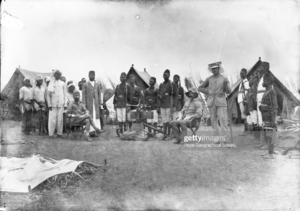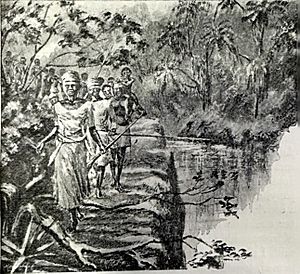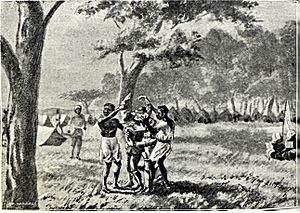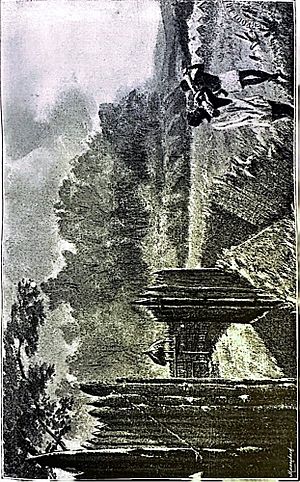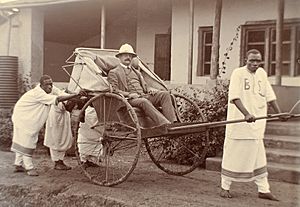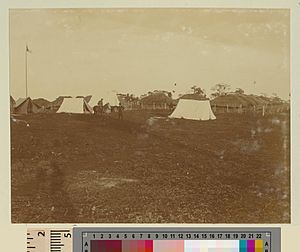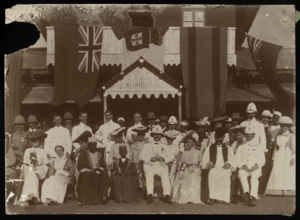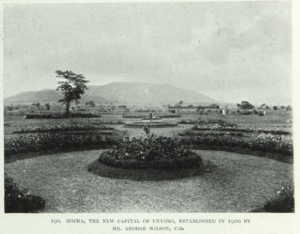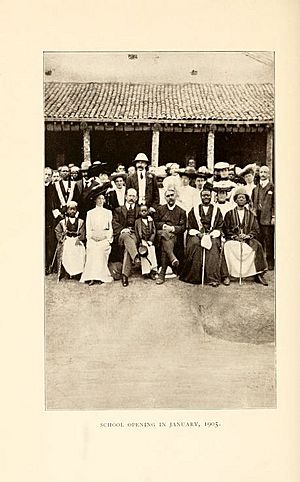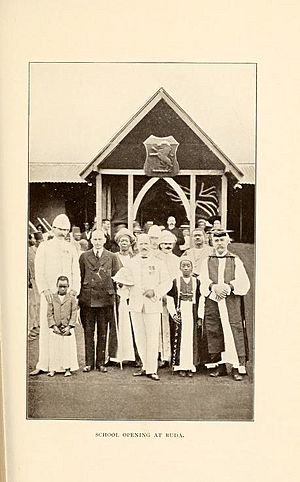George Wilson (Chief Colonial Secretary of Uganda) facts for kids
Quick facts for kids
|
|
|---|---|
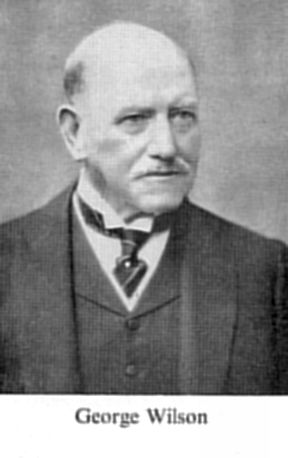 |
|
| Commissioner and Consul-General of Uganda | |
| H.M. Commander in Chief of the Uganda Protectorate | |
| In office 20 years |
|
| In office August 1894 – 1 March 1909 |
|
| Appointed by | colonial office |
| Monarch | Queen Victoria king Edward VII |
| Governor | Sir Henry Hesketh Bell |
| Vice Governor | George Wilson C.B. |
| Preceded by | Sir Henry Edward Colvile |
| Succeeded by | Lt. Stanley Charles Tomkins CMG,MBE |
| Personal details | |
| Born | 13 May 1862 Glasgow, Lanarkshire, Scotland |
| Died | 12 December 1943 (Aged 81) Royal Tunbridge Wells |
| Spouses | Clarissa Adelina Humphreys m. 20 Feb 1900 |
| Domestic partner | Swahili woman from Mombasa |
| Children | Edward Wilson |
| Parents | George Wilson and Jane Leslie |
| Residence | Kent, England |
| Occupation | retired Government official |
| Profession | Colonial administrator, senior civil service, Explorer |
| Awards | Companion of the most Honourable order of the Bath (CB) |
| Nickname | Bwana Tayari |
| Military service | |
| Allegiance | British Empire |
| Years of service | 20 |
| Rank | Chief secretary |
| Battles/wars | Sudanese mutiny |
George Wilson (13 May 1862 – 12 December 1943) was an important British official in Uganda. He was known as bwana tayari, which means "Mr. Ready," by local people in the East Africa Protectorate. He worked for the Imperial British East Africa Company and was a key assistant to Sir Frederick Lugard during his journey to Uganda in 1890.
Wilson joined the Uganda government in 1894. He was in charge of the Uganda Protectorate when the Sudanese mutiny (an uprising) happened in 1897. He became the first transport officer and assistant in the Protectorate. Later, he served as the acting leader and commander of the Uganda Protectorate. He also helped create the 1901 Ankole agreement. Wilson was a fellow at the Royal Society of Arts and received a silver medal for his work.
Contents
Early Life and Adventures
George Wilson was born in 1862 in Glasgow, Scotland. His father, George Wilson Senior, was a sculptor. His mother, Jane Leslie, managed their home. When George was five, his family moved to Australia.
He grew up in Australia and later became a music hall entertainer. In 1889, he sailed to East Africa with his brother, Charles Wilson. They arrived independently, not as part of the IBEA.
Exploring East Africa and British Service
According to the diaries of Lord Lugard, George Wilson was working near Mombasa in 1889. He joined the Imperial British East Africa Company in January 1890. On August 6, 1890, he joined Lugard on a trip up the Sabaki River.
During this journey, they found a caravan with people who were being held against their will. Wilson and Lugard helped free them. Wilson faced many health problems during this trip. Lugard helped him recover, showing how much he valued Wilson.
Lugard thought highly of Wilson, especially his success with the Kikuyu community. Wilson also taught Lugard important lessons about working with local people. They stayed in touch for many years, discussing important issues.
Wilson also worked with the Scottish Industrial Mission at Kibwezi. In 1891, he helped take back control of Fort Dagoretti. He also helped build the Mackinnon Road, which improved trade with Uganda. He hired WaKamba workers for this project.
Wilson joined the Uganda service on August 30, 1894. He quickly became known for his strong leadership in Kampala. He was put in charge of the Protectorate during the Sudanese mutiny in September 1897.
Early on, Wilson faced challenges with local groups. He was ambushed by the Kikuyu under Waiyaki Wa Hinga. This forced Wilson and his men to leave Fort Dagoretti. This was one of the first big fights between the Agikuyu and British forces.
Despite these early difficulties, Wilson's career continued to grow. He was patient and eager to work with local people. He learned several local languages, including Swahili and Maasai. He was known as bwana tayari because he understood the country very well.
On August 30, 1894, George Wilson became the first transport officer and assistant of the Uganda Protectorate. By January 31, 1895, he was a sub-commissioner of the Buganda Kingdom. From November 5, 1897, to January 29, 1898, Wilson was the acting commissioner and commander of the Uganda Protectorate.
He received the C.B. award on January 2, 1899, for his efforts during the 1894 Sudanese uprising. This award is a very high honor, second only to a knighthood.
In the following years, George Wilson helped with important developments. He oversaw the Buganda Agreement of 1900. In 1901, he visited Ankole and helped draft the Ankole agreement. This agreement was signed on August 7, 1901, to formalize relations between the British and the Ankole people.
Wilson was very involved in shaping how Uganda was governed. He worked closely with local chiefs. He gave more power to local courts and African leaders. This system, largely designed by Wilson, was used in Uganda for the next 60 years. He is seen as the main person behind Uganda's local policies.
On April 1, 1902, he became the assistant leader of the Uganda Protectorate in Entebbe. He helped the Sleeping Sickness Commission, a group of medical experts investigating a serious disease outbreak. Wilson also asked the colonial office to protect African farmers. He wanted them to be allowed to kill elephants that attacked people and crops.
From 1904 to 1906, George Wilson was His Majesty's commander and acting commissioner. He handled many daily tasks and reports. In January 1908, he banned fishing on Lake Victoria to help with disease control.
Wilson also led the investigation into the death of Harry George Galt, a colonial officer. Wilson believed Galt's death was politically motivated. He urged the government to investigate and take action.
On April 27, 1907, Wilson again took over as commander of the Uganda Protectorate. Later that year, when Winston Churchill visited Uganda, Sir Hesketh Bell became governor, making Wilson the assistant governor. Wilson retired on March 1, 1909, due to poor health.
Wilson did face some criticism. He was criticized for how he handled the Nyangire rebellion]. He initially thought missionaries were behind it, not the local people. He also expressed views that suggested European superiority, which shaped his approach to governing. However, he was proud that Uganda was becoming "less anti-malarial" under his leadership.
Achievements and Honors
On November 28, Mengo Hospital (also called Namirembe Hospital) was founded by acting commissioner George Wilson.
Hoima, a town in the Bunyoro district, was made the capital of Bunyoro in 1900 by Commissioner Wilson. He formally recognized it as the main administrative center.
For his excellent service during the 1894 Sudanese uprising, he received the CB award on January 2, 1899. Sir Albert Cook later wrote that Wilson "richly deserved his CB."
Wilson also wrote about his experiences in Uganda. His 28-page notes were published as a book called Uganda; notes for travellers, by Mr George Wilson, CB. You can find it on the UK national archives website.
On November 7, 1906, Wilson gave a speech at the Royal African Society in London. He presented his paper, "The progress of the Uganda Protectorate," which received much praise. On January 15, 1907, he read the same paper at the Royal Society of Arts, with his old friend Sir Frederick Lugard leading the event. On June 28, 1907, George Wilson received a silver medal and became a fellow of the Royal Society of Arts for his important contributions.
Wilson also helped develop a better postal system in Uganda. He worked with Rev. Ernest Millar to improve communication.
On January 25, 1905, George Wilson formally opened Mengo High School, which was a big step for education. The next year, on March 29, 1906, he opened King's College Budo. The young King Daudi Chwa and Bishop Tucker were with him at the opening.
On January 15, 1908, Wilson, as deputy governor, instructed all colonial administrations to buy items of cultural value. These items were to be sent to the colonial capital, Entebbe, to start a museum.
Wilson's letter stated: "I am directed to inform you that his excellency the Governor has made arrangements for the opening in Entebbe of a Protectorate Museum, for the collection of local curios of all descriptions, such as articles of interest and specimen of native weapons and manufactures, and local products, vegetables and mineral: in fact of all articles of historical, ethnological and local industries of interest."
The Uganda Museum is now the oldest museum in East Africa. It was founded in 1908 by George Wilson, who first suggested the idea in 1902. The items were first kept in Fort Lugard. Later, they were moved to a permanent home at Kitante Hill in 1954. There is also a place called Fort George in western Uganda, named after George Wilson and George Mackenzie.
Personal Life
On February 20, 1900, George Wilson married Clarissa Adelina Humphreys in East Twickenham. Clarissa later lived in Uganda with her husband. After Wilson retired from colonial service, they lived in Hythe, Kent, then Lyminge in Kent. Their last home was in Royal Tunbridge Wells, Kent, where they lived for the rest of their lives.
George Wilson died on December 12, 1943, in Royal Tunbridge Wells. His wife, Clarissa, died on July 5, 1958. Wilson had at least one child, Edward Wilson, with a Swahili woman from Mombasa. Edward Wilson had many children, creating a large family tree. Today, Wilson is survived by many grandchildren and great-grandchildren.
Published Work
- "The progress of the Uganda Protectorate"
- "Uganda; notes for travellers, by Mr George Wilson, CB" (28 pages)
 | Precious Adams |
 | Lauren Anderson |
 | Janet Collins |


